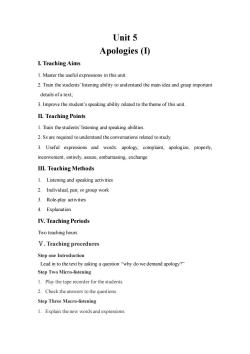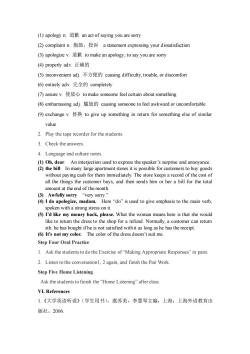《大学英语读写》课程教学资源(听说一级教案)Unit 5 Apologies(I)

Unit5 Apologies (D) I.Teaching Aims 1.Master the useful expressions in this unit. 2.Train the students'listening ability to understand the main idea and grasp important details of a text; 3.Improve the student's speaking ability related to the theme of this unit. II.Teaching Points 1.Train the students'listening and speaking abilities 2.Ss are required to understand the conversations related to study. 3.Useful expressions and words:apology,complaint,apologize,properly, inconvenient,entirely,assure,embarrassing.exchange III.Teaching Methods 1.Listening and speaking activities 2.Individual,pair,or group work 3.Role-play activities 4.Explanation IV.Teaching Periods Two teaching hours V.Teaching procedures Step one Introduction Lead in to the text by asking a question"why do we demand apology?" Step Two Micro-listening 1.Play the tape recorder for the students. 2.Check the answers to the questions. Step Three Macro-listening 1.Explain the new words and expressions
Unit 5 Apologies (I) I. Teaching Aims 1. Master the useful expressions in this unit. 2. Train the students’ listening ability to understand the main idea and grasp important details of a text; 3. Improve the student’s speaking ability related to the theme of this unit. II. Teaching Points 1. Train the students’ listening and speaking abilities. 2. Ss are required to understand the conversations related to study. 3. Useful expressions and words: apology, complaint, apologize, properly, inconvenient, entirely, assure, embarrassing, exchange III. Teaching Methods 1. Listening and speaking activities 2. Individual, pair, or group work 3. Role-play activities 4. Explanation IV. Teaching Periods Two teaching hours Ⅴ. Teaching procedures Step one Introduction Lead in to the text by asking a question “why do we demand apology?” Step Two Micro-listening 1. Play the tape recorder for the students. 2. Check the answers to the questions. Step Three Macro-listening 1. Explain the new words and expressions

(I)apology n.道歉an act of saying you are sorry (2)complaint n.抱怨,投诉a statement expressing your dissatisfaction (3)apologize v.to make an apology;to say you are sorry (4)properly adv.正确的 ()⑤inconvenient adj.不方便的causing difficulty,trouble,ordiscomfort (6)entirely adv.完全的completely (7)assure v.使放心to make someone feel certain about something (8)embarrassing adj.causing someone to feel awkward or uncomfortable (9)exchange v.to give up something in return for something else of similar value 2.Play the tape recorder for thestudents. 3.Check the answers. 4.Language and culture notes. (1)Oh,dear.An interjection used to express the speaker's surprise and annoyance. (2)the bill In many large apartment stores it is possible for customers to buy goods without payings for thmimmdiaeyThesrkeepsaf all the thi the customer buys and then snds himr her a bill for the total amount at the end of the month (3)Awfully sorry "very sorry." (4)I do apologize,madam.Here "do"is used to give emphasis to the main verb, spoken with a strong stress on it. (5)I'd like my money back,please.What the woman means here is that she would the shop fora refund.Nommally customer en retum sth.he has bought if he is not satisfied with it as long as he has the receipt. (6)It's not my color.The color of the dress doesn't suit me. Step Four Oral Practice 1.Ask the students to do the Exercise of"Making Appropriate Responses"in pairs. 2.Listen to the conversationl.2 again,and finish the Pair Work. Step Five Home Listening Ask the students to finish the"Home Listening"after class. VI.References 1.《大学英语听说》(学生用书),虞苏美,李慧琴主编,上海:上海外语教育出 版社,2006
(1) apology n. 道歉 an act of saying you are sorry (2) complaint n. 抱怨,投诉 a statement expressing your dissatisfaction (3) apologize v. 道歉 to make an apology; to say you are sorry (4) properly adv. 正确的 (5) inconvenient adj. 不方便的 causing difficulty, trouble, or discomfort (6) entirely adv. 完全的 completely (7) assure v. 使放心 to make someone feel certain about something (8) embarrassing adj. 尴尬的 causing someone to feel awkward or uncomfortable (9) exchange v. 替换 to give up something in return for something else of similar value 2. Play the tape recorder for the students. 3. Check the answers. 4. Language and culture notes. (1) Oh, dear. An interjection used to express the speaker’s surprise and annoyance. (2) the bill In many large apartment stores it is possible for customers to buy goods without paying cash for them immediately. The store keeps a record of the cost of all the things the customer buys, and then sends him or her a bill for the total amount at the end of the month. (3) Awfully sorry “very sorry.” (4) I do apologize, madam. Here “do” is used to give emphasis to the main verb, spoken with a strong stress on it. (5) I’d like my money back, please. What the woman means here is that she would like to return the dress to the shop for a refund. Normally, a customer can return sth. he has bought if he is not satisfied with it as long as he has the receipt. (6) It’s not my color. The color of the dress doesn’t suit me. Step Four Oral Practice 1. Ask the students to do the Exercise of “Making Appropriate Responses” in pairs. 2. Listen to the conversation1, 2 again, and finish the Pair Work. Step Five Home Listening Ask the students to finish the “Home Listening” after class. VI. References 1.《大学英语听说》(学生用书),虞苏美,李慧琴主编,上海:上海外语教育出 版社,2006

2.《大学英语听说》(教师用书),虞苏美,李慧琴主编,上海:上海外语教育出 版社,2006. 3.An Advanced English Grammar.薄冰主编.北京:高等教育出版社,1996 4.牛津高阶英汉双解词典(第六版).牛津大学出版社,2004
2.《大学英语听说》(教师用书),虞苏美,李慧琴主编,上海:上海外语教育出 版社,2006. 3. An Advanced English Grammar. 薄冰 主编. 北京:高等教育出版社,1996. 4. 牛津高阶英汉双解词典(第六版). 牛津大学出版社,2004
按次数下载不扣除下载券;
注册用户24小时内重复下载只扣除一次;
顺序:VIP每日次数-->可用次数-->下载券;
- 《大学英语读写》课程教学资源(听说一级教案)Unit 4 Unit 4 Study(II).doc
- 《大学英语读写》课程教学资源(听说一级教案)Unit 3 Unit 3 Study(I).doc
- 《大学英语读写》课程教学资源(听说一级教案)Unit 2 Unit 2 Meeting People(II).doc
- 《大学英语读写》课程教学资源(听说一级教案)Unit 15 Description(I).doc
- 《大学英语读写》课程教学资源(听说一级教案)Unit 14 Shopping(II).doc
- 《大学英语读写》课程教学资源(听说一级教案)Unit 13 Shopping(I).doc
- 《大学英语读写》课程教学资源(听说一级教案)Unit 12 Asking the Way(II).doc
- 《大学英语读写》课程教学资源(听说一级教案)Unit 11 Dining Out(I).doc
- 《大学英语读写》课程教学资源(听说一级教案)Unit 10 Daily Activities(II).doc
- 《大学英语读写》课程教学资源(听说一级教案)Unit 1 Meeting People(I).doc
- 山西农业大学:《植保专业外语》课程教学资源(电子教案,授课教师:郝赤).doc
- 天津开放大学:《日语》课程教学资源(辅导资料)课程说明_日语(1).doc
- 天津开放大学:《法语》课程教学资源(学习资料)课程教学大纲_法语(1).doc
- 天津开放大学:《法语》课程教学资源(学习资料)讲法语的42个国家与地区_法语(1).doc
- 天津开放大学:《法语》课程教学资源(学习资料)考核说明_法语(1).doc
- 天津开放大学:《日语》课程教学资源(辅导资料)考核说明_日语(1).doc
- 天津开放大学:《日语》课程教学资源(辅导资料)考核说明_日语(2).doc
- 天津开放大学:《法语》课程教学资源(学习资料)第四章辅导_法语(1).doc
- 天津开放大学:《法语》课程教学资源(学习资料)第四次形考作业讲评_法语(2).doc
- 天津开放大学:《法语》课程教学资源(学习资料)第四次形考作业讲评_法语(1).doc
- 《大学英语读写》课程教学资源(听说一级教案)Unit 6 Apologies(II).doc
- 《大学英语读写》课程教学资源(听说一级教案)Unit 7 Asking the Way(I).doc
- 《大学英语读写》课程教学资源(听说一级教案)Unit 8 Asking the Way(II).doc
- 《大学英语读写》课程教学资源(听说一级教案)Unit 9 Daily Activities(I).doc
- 《大学英语读写》课程教学资源(听说一级教案)Unit 16 Unit 16 Description(II).doc
- 《大学英语读写》课程教学资源(听说二级教案)Topic 1 Telephoning.doc
- 《大学英语读写》课程教学资源(听说二级教案)Unit 3 giving advice(I).doc
- 《大学英语读写》课程教学资源(听说二级教案)Unit 7 & 8.doc
- 《大学英语读写》课程教学资源(听说二级教案)Unit 9 & 10 Seeing the Doctor.doc
- 《大学英语读写》课程教学资源(听说二级教案)Unit 13 Dating(I).doc
- 《大学英语读写》课程教学资源(听说二级教案)Unit 14 Dating(II).doc
- 《大学英语读写》课程教学资源(听说二级教案)Unit 1 & 2 Telephoning.doc
- 《大学英语读写》课程教学资源(听说二级教案)Unit 11 & 12 Teaching Aims.doc
- 《大学英语读写》课程教学资源(听说二级教案)Unit 13 & 14 Dating.doc
- 《大学英语读写》课程教学资源(听说二级教案)Unit 15 & 16 Lifestyle.doc
- 《大学英语读写》课程教学资源(听说二级教案)Unit 3 & 4 Giving Advice.doc
- 《大学英语读写》课程教学资源(听说二级教案)Unit 5 & 6 Talking About theWeather.doc
- 《大学英语读写》课程教学资源(听说三级教案)Unit 10 Law and order.doc
- 《大学英语读写》课程教学资源(听说三级教案)Unit 11 Story Time.doc
- 《大学英语读写》课程教学资源(听说三级教案)Unit 12 Famous People.doc
